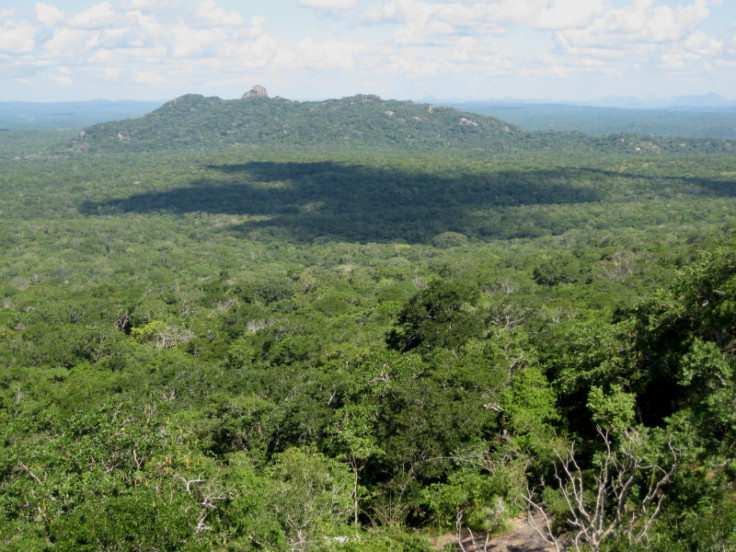As China Imports Timber Illegally, Mozambique Pays The Price

If a tree falls in the forests of Mozambique and the authorities don’t hear about it, does it still have an impact?
The answer is a resounding yes, according to a new report from the London-based Environmental Investigation Agency, or EIA. The illegal harvest of timber in Mozambique, most of which is exported to Chinese consumers, hurts the Mozambican people in more ways than one.
“Trade data discrepancies indicate that in 2012 Chinese companies imported between 189,615 and 215,654 cubic meters of timber illegally exported from Mozambique -- constituting up to 48 percent of China’s imports from the country,” the report said. “Such crimes are costing Mozambique tens of millions of dollars a year in lost tax revenues -- funds desperately needed in what is the world’s fourth least-developed nation.”
Mozambique, a country of 24 million people located just northeast of South Africa, is politically stable but underdeveloped. About half the population lives in poverty, and the GDP per capita is at US$535, according to World Bank data.
But Mozambique is nevertheless making impressive progress. It is recovering well from a devastating civil war that lasted from 1977 to 1992 and killed about 1 million people. A democracy has been established, and economic growth reached 7.5 percent last year.
But in order to fully realize its potential, Mozambique will have to enforce regulations that keep commerce fair. In the case of timber, that involves dealing with corruption -- a major domestic issue -- and calling on foreign importers to respect trade laws. Chinese importers will also have to address the issue on their end, though they have less incentive to do so.
“There are a couple reasons why China is not regarded as a good global citizen regarding the timber industry,” William F. Laurance, a forest conservation expert and research professor at James Cook University in Australia, said.
“One is their overwhelming preference for raw timber; the other is their habit of not supporting international measures to combat illegal logging. There’s no single solution; you need both the consumer nations and the producing nations involved.”
China has ramped up its trade activities with countries all across Africa over the last few years. The Asian superpower is hungry for raw materials -- not only timber, but also oil, gas and minerals -- that Africa has in abundance. Total bilateral trade between China and African countries last year exceeded $200 billion.
More than $1 billion of that exchange took place between China and Mozambique alone, but even more was exchanged off the books.
The EIA found that the timber China gets from Mozambique on an annual basis actually exceeds the total amount that Mozambicans are allowed to cut down.
“Indeed, between 2007 and 2012, China’s registered timber imports from Mozambique exceeded Mozambique’s licensed legal harvest volume every year except 2009. Over the period, Chinese firms have imported 401,181 cubic meters more than was licensed for legal harvest by Mozambique,” it said.
“The financial loss caused by this illegal trade is substantial. In 2010, Mozambican export figures recorded $49 million worth of timber being shipped to China. Chinese import figures show $134 million of timber entering the country from Mozambique, meaning that $85 million went missing.”
The problem hasn’t gone unnoticed by Mozambique officials. In 2011, the government implemented a new policy whereby all exported timber must be inspected by customs. The move was meant to enforce laws stating that unprocessed, top-quality logs are not allowed for export at all. Lower-grade unprocessed timber may be exported, but only with a surtax of 20 percent.
The ultimate goal was to incentivize domestic timber processing, which would create jobs in Mozambique and keep money circulating -- essentially growing the economy from the ground up rather than relying on taxes, which go straight to the government.
But the data collected by EIA indicates that smugglers have managed to circumvent this rule.
“In 2012, the Mozambican government registered 260,385 cubic meters of log and sawn timber exports to world markets, including China, while China alone registered 450,000 cubic meters of log and sawn timber imports from Mozambique,” the report said.
“The 189,615 cubic meter discrepancy is made up almost entirely of logs smuggled out of Mozambique by Chinese companies and is likely to consist largely of the so-called ‘first class’ species of timber -- all prohibited from export.”
Part of the problem has to do with the nature of illegal smuggling, which is becoming increasingly sophisticated as authorities make attempts to clamp down.
“These illicit activities are not the easiest thing to study, but recent reports suggest there’s been some reduction of the more blatant types of illegal logging and an emergence of more organized syndicates, using much more sophisticated ways to circumvent new measures brought in,” Laurance said.
“Interpol [the International Criminal Police Organization] is basically making a decision, because this is becoming an increasingly organized activity, of bringing in the kinds of tactics they have tended to use to fight things like international drug smuggling -- tracking money, identifying kingpins, targeting specific syndicates.”
A September report from Interpol and the United Nations found that illegal trade in timber around the world now accounts for between 15 and 30 percent of the legal exchange and that the criminal networks spawned by these activities must be addressed by collaborative action from the international community.
And while Interpol and other global entities continue these efforts, it is up to Mozambique to do everything it can to fight this problem from the ground up. The EIA calls on officials there to clamp down on corruption at all levels, enforce a ban on the export of all raw logs and cooperate more closely with Chinese officials to come up with a protocol that will enable trade to flourish between the two countries without unfairly hampering development in Mozambique.
© Copyright IBTimes 2024. All rights reserved.






















